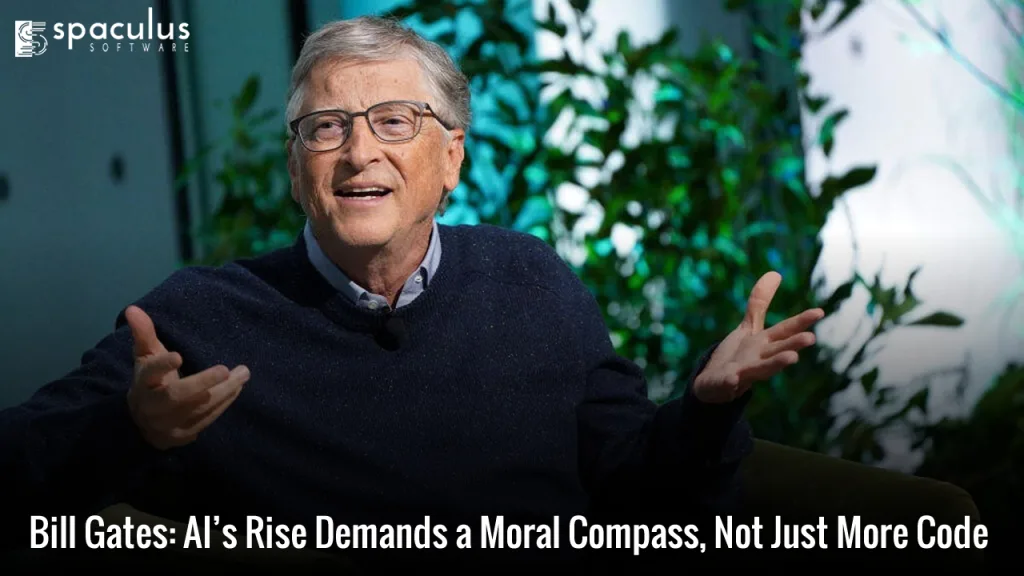
AI is breaking new ground every month. From generative models coding software in seconds to tools predicting disease risks faster than doctors — we’re watching machines grow more capable by the day.
But while the tech world cheers, Bill Gates is asking what few are willing to:
Are we advancing intelligence faster than we’re teaching responsibility?
This isn’t a rejection of AI — it’s a demand for discipline and direction before the tools we build outgrow our moral understanding.
From 2023 to 2025, the AI sector exploded. Startups raised billions. Enterprises adopted LLMs. And government agencies began integrating AI into policing, education, and infrastructure.
But Gates sees a pattern repeating — a rush to build without asking what happens when things go wrong.
For example:
None of these failures came from malice. They came from blind trust in systems that lack moral reasoning.
According to Gates, AI doesn’t have values — it inherits them from the humans and data that shape it.
And if those humans don’t pause to define fairness, accountability, or harm, the AI doesn’t pause either.
That’s the risk. Not that AI thinks for itself, but that it amplifies our blind spots at scale.
In recent years, companies have suffered major PR crises because of AI missteps:
These weren’t edge cases. These were deployed products with no safety net.
Gates argues that companies must now view ethical design as risk management, not just goodwill.
Gates also warns that waiting for regulation is a mistake.
Why?
Because public trust collapses faster than laws pass.
In a world where consumers are demanding more transparency and ethical clarity, the companies that win won’t just be the fastest — they’ll be the ones that people believe are safe to use.
To Gates, fixing AI ethics isn’t about adding a legal department. It’s about changing how teams build AI from day one.
He recommends a set of non-negotiables for any serious AI company:
Every dataset must be reviewed for bias, exclusion, and representation gaps. You can’t fix a broken system with broken data.
Bring in sociologists, ethicists, disabled users, and underrepresented voices before launch — not after headlines break.
Just as cybersecurity has penetration testers, AI needs adversarial testing to uncover hidden risks.
Companies should track not just performance, but who benefits and who gets left out.
Another key Gates position is that black-box systems shouldn’t be acceptable in high-impact domains.
If an AI recommends a diagnosis, approves a bank loan, or flags someone to law enforcement — we must know why.
And if no one can explain the outcome, Gates believes the model should not be used in that context.
Gates is pushing for a redefinition of “technical excellence.”
He believes future engineers must:
Today, most coding bootcamps and computer science programs ignore this completely.
Gates is calling for universities to teach ethics, philosophy, and sociology as required parts of AI-related degrees — not electives.
He’s not asking developers to become moral philosophers. He’s asking them to become conscious creators.
Because when you’re coding a system that might impact 10 million users in real time, intentional design is no longer optional.
While some companies are trying — Microsoft, OpenAI, and Anthropic have internal ethics teams — most are not.
Gates argues that we need public standards, not private promises.
This could look like:
Without this, Gates fears that the incentives to deploy dangerous AI will always outpace the incentives to pause.
At the heart of Gates’ concern is one deep truth:
“AI doesn’t create values. It reflects the values of its makers.”
If we build systems focused only on productivity, they will value speed over humanity.
If we optimize for profit alone, they’ll learn to disregard fairness.
If we fail to teach judgment, they’ll mimic the worst parts of our thinking.
But if we take responsibility early — AI could help us solve what’s unsolvable today.
Climate forecasting. Cancer detection. Inclusive education. Real-time accessibility. Honest policymaking.
It’s all possible — but only if the people building AI are as thoughtful as they are brilliant.
Bill Gates isn’t calling for slower AI. He’s calling for wiser AI.
He knows code can do amazing things.
But he also knows code without conscience can destroy trust, divide people, and magnify harm.
If we don’t define the moral limits of our systems, someone else — or something else — eventually will.
AI isn’t asking where it’s going.
We are.
And that’s exactly why, in 2025, asking the hard questions is no longer optional — it’s leadership.